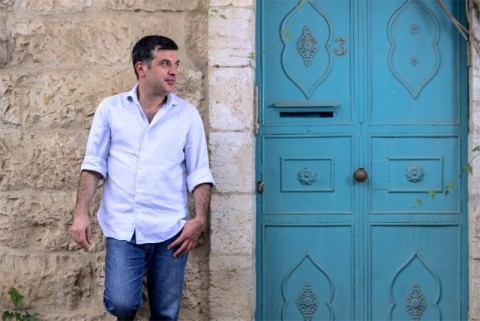NYU Gallatin student Sara Nuta reviews Sayed Kashua’s talk, “Cultural Criticism through Humor,” held at NYU Gallatin on March 10, 2016 as part of its Distinguished Faculty Lecture series, co-sponsored by the Urban Democracy Lab.
Sayed Kashua–a screenwriter, novelist, and journalist–spoke about Cultural Criticism through Humor at NYU Gallatin’s Jerry H. Labowitz Theatre for the Performing Arts on Thursday, March 10th, 2016. The author of three novels: Dancing Arabs, Let It Be Morning, and Second Person Singular, Kashua discussed the complicated politics surrounding his writings.
Kashua is a Palestinian citizen of Israel. He writes a weekly column for the Israeli newspaper, Haaretz. He spoke about the complex nature of using Hebrew, the “language of the oppressor,” in order to criticize a country wherein he has experienced racial discrimination.
“I will tell you a joke, and maybe you will laugh, and I will tell you another joke, and maybe we can laugh together, and then maybe I can tell you a sad story.”
This is the basis of Sayed Kashua’s approach to cultural criticism. He believes that humor is an effective platform to express criticism because people are more open to comedy than other mediums.
Once based in Jerusalem, Kashua now lives in Champaign-Urbana, Illinois. Feeling as though he could no longer handle the “racism and despair” in Israel, he has elected America as his home for the last year and a half.
Though the author and journalist misses the sense of humor in Jerusalem and continues to write his weekly column, he is trying to quit. “I am trying to quit Haaretz, I don’t feel any . . . I don’t know what I’m doing here. I’m just writing about the uber driver in Champaign-Urbana.”
Kashua’s use of humor is a vector for expressing his sentiment towards the socio-political situation in Israel. Rather than making a conscious choice to make people laugh, his satirical work is more of a natural representation of his feelings towards the political state. Most of the time, the comedy is less of a choice and more of a necessity in order to be heard.
Kashua’s television show, Arab Labor, “focuses on Amjad Alian, a Palestinian journalist and Israeli citizen in search of his identity. Poking fun at the cultural divide, Kashua and his characters play on the religious, cultural and political differences to daringly depict the mixed society that is Israel” (linktv.org).
Arab Labor was the first Israeli television show to present Palestinian characters speaking Arabic on primetime. The show stirred up controversy over the stereotypical nature of its characters and the first season was harshly criticized. Kashua explained that he used a lot of stereotypes in the first season because he felt like he had nothing to lose when dealing with and addressing these political issues. Also he was able to shed light on the taboo difficulties that Palestinian citizens of Israel face. He explained, “Humor, as you know, can humanize the characters.”
The 2nd, 3rd, and 4th season were well-received. However, Kashua grew disillusioned with the political situation and his ability to enact any real change through his show. He recounted thinking to himself, “What am I doing here? Can we change reality and can we change politics with humor?”
Kashua also discussed the complexities of writing in Hebrew, the language of the state of Israel, as a Palestinian member of Israel. He explains how it’s better to use Hebrew to address Arabs, despite the fact that Hebrew is viewed as the language of the “the enemy, the other, the oppressor.” He notes that Hebrew is the biggest achievement of Zionism and modern Hebrew is not just a language but the establishment of a new kind of Judaism.
“I’ve always thought it’s very important to address the majority because, in a way, our lives are in their hands.”
In essence, Kashua must speak in Hebrew if he wants the majority to hear him. Kashua described how he uses Hebrew as a way to protect himself, and uses humor to sell. Another form of protection, Kashua states, is the city itself. He finds that the urban setting lends a “protective or safe feeling” that allows him to “write about tough or difficult things.” The modern, urban society is a more conducive platform to criticize religion, patriarchy, and discriminatory politics than the small, rural town. In small villages, such as Tirra, where Kashua grew up, one must be more careful about these topics for fear of persecution. He nonetheless questions whether he is really just censoring himself by writing in Hebrew or if he actually has a choice.
Kashua comically recounts several anecdotes. He recalls a time where a hotel manager would not let him book a room, and another when a woman in America told him he was white when he did not know how to fill out a standardized form that asked for his race. Much like his work itself, Kashua easily shifts from heavy, somber topics to light-hearted jokes and stories.
Kashua explains that in order to use humor or satire, you need to have a “basic feeling of stability in life, and of you course, you need a lot of hope.” However, Kashua has since grown disheartened with the political situation and felt he could no longer lie to his kids and tell them that one day they can be perceived as equals in the state of Israel. He has lost hope, no longer believing that these two groups can live harmoniously.
Kashua’s speech was marked by a sense of pessimism. Ultimately, the author, journalist and screenwriter, has become disillusioned with the prospect of being able to create change through humor, mockery and sarcasm. He has realized that “power only respects power” and it is very difficult for the average citizen to be heard and generate progress. Claiming that he is no longer “naive” enough to believe in existence of true freedom of speech in Israel–which for Kashua is what makes him sad to use humor–he realizes that perhaps his satire may not be able to impact the seemingly endless political strife in Israel.

